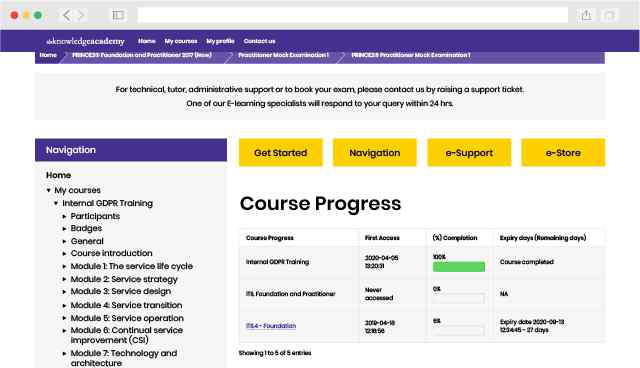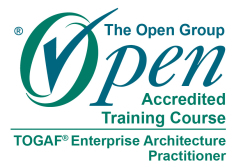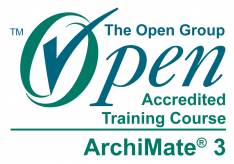ArchiMate® 3 Training Course Overview
ArchiMate® 3 Training Course Outline
Module 1: Basic Concepts and Definitions
- Introduction to ArchiMate® Language
- ArchiMate® Language for Enterprise Architecture Modelling
- What is Enterprise Architecture?
- Key Enterprise Architecture Concepts
- Stakeholders and Concerns
- Development of Enterprise Architectures
- Example ArchiMate® Model
Module 2: Language Structure
- Top-Level Hierarchy of ArchiMate® Concepts
- Layering of ArchiMate® Language
- Definition: ArchiMate® Core Language
- ArchiMate® Core Framework
- Abstract in ArchiMate® Language
- External Vs Internal
- Types Vs Instances
- Behavior Vs Active Structure
- Concepts and their Notation
- Conceptual Vs Logical Vs Physical
- Types Vs Instances
- Use of Nesting
- Use of Colors and Notational Cues
Module 3: Generic Metamodel
- Design Approach
- Metamodels at Different Levels of Specificity
- Design and Core Concepts
- Hierarchy of Behavior and Structure Elements
- Behavior and Structure Elements Metamodel
- Behavior Elements Notation
- Aspects
- Additional Behavior Element Type: Event
- Passive Structure Elements
- Active Structure Elements Notation
- Summary of Specialization of Core Elements
- Specialisations of Structure and Behavior Elements
- Motivation and Composite Elements
- Grouping
- Location
Module 4: Modelling Relationships
- Relationships
- Structural Relationships
- Dependency, Dynamic, and Other Relationship
- Relationship Review
Module 5: Modelling Motivation
- Motivation Elements
- Motivation Elements Metamodel
- Stakeholder, Driver, and Assessment
- Goals and Outcomes
- Principles, Requirements, and Constraints
- Meaning and Value
- Relationships with Core Elements
Module 6: Modelling Strategy
- Strategy Elements Metamodel
- Relationships with Motivation and Core Elements
- Strategy Elements
Module 7: Business Layer
- Metamodel
- Active Structure, Behavior, and Passive Structure
- Composite Element
Module 8: Application Layer
- Application Layer Metamodel
- Active Structure
- Behavior Structure
- Passive Structure
Module 9: Technology Layer
- Metamodel
- Active Structure Elements
- Behavior Structure
- Passive Structure Elements
Module 10: Modelling Physical Elements
- Physical Elements Metamodel
- Active Structure Elements
- Behavior Elements
- Passive Structure Elements
Module 11: Relationships Between Core Layers
- Alignment of the Business Layer and Lower Layers
- Alignment of the Application and Technology Layers
- Derived Relationships Applied in Relationships Between Core Layers
Module 12: Modelling Transformation
- Implementation and Migration of Metamodel
- Implementing and Migrating Elements
- Relationships with Other Aspects and Layers
Module 13: Addressing Stakeholder Concerns with Architecture Views and Viewpoints
- Introduction to Architecture Views and Viewpoints
- Stakeholders and Concerns
- Architecture Views and Viewpoints
- Viewpoint Mechanism
- Viewpoint Purpose and Content
Module 14: Derivation of Relationship
- Derivation Rules
- Two Types of Derivation
- Notation of Derivation Rules
- Derivation Rules for Potential Relationships
- Restrictions on Applying Derivation Rules
Module 15: Motivation Viewpoint
- Stakeholder Viewpoint
- Goal Realization Viewpoint and Contribution Viewpoint
- Principles Viewpoint
- Requirements Realization Viewpoint
- Motivation Viewpoint
Module 16: Strategy Viewpoints
- Strategy Viewpoint
- Capability Map Viewpoint and Value Stream Viewpoint
- Outcome Realization Viewpoint
- Resource Map Viewpoint
Module 17: Basic Viewpoints – Business Layer and Application Layer
- Organization Viewpoint
- Business Process Cooperation Viewpoint
- Product Viewpoint
- Application Cooperation Viewpoint
- Application Usage Viewpoint
Module 18: Basic Viewpoints – Technology Layer
- Implementation and Deployment Viewpoint
- Technology Viewpoint
- Technology Usage Viewpoint
Module 19: Implementation and Migration Viewpoints
- Project Viewpoint
- Migration Viewpoint
- Implementation and Migration Viewpoint
Module 20: Applying the Viewpoint Mechanism
- Defining and Classifying Viewpoints: Purpose Dimension
- Creating the View
- Application of the Viewpoint Mechanism in Real-Case Modelling Situations
Module 21: Language Customization Mechanisms
- Why Should We Customize the Language?
- Adding Attributes to ArchiMate® Elements and Relationships
- Profile and Profile Types
- Creating New Element Types Using Specialization
- Specialization of Elements and Relationships
- Using Specializations to Model Risk Analysis
- Creating a Profile for Risk Analysis
ArchiMate® is a registered trademark of The Open Group.


Who should attend this ArchiMate® 3 Training Course?
This ArchiMate® 3 Course in the United States is intended for individuals involved in Enterprise Architecture projects or those planning to initiate one, and who need to understand the Enterprise Architecture artefacts crafted using ArchiMate®. Professionals who can greatly benefit from this course are as follows:
- Enterprise Architects
- Solution Architects
- Technology Architects
- Business Architects
- Information Architects
- IT Architects
- Application Architects
- Data Architects
Prerequisites of the ArchiMate® 3 Training Course
There are no formal prerequisites for attending this ArchiMate® 3 Course.
ArchiMate® 3 Training Course Overview
The ArchiMate® 3 Training Course in the United States offers a specialized program designed to equip individuals with the knowledge and skills needed to comprehend and utilize the ArchiMate® 3 modeling language for enterprise architecture. ArchiMate® 3 is an industry-standard language utilized for visualizing, analyzing, and communicating complex architectural concepts and relationships within organizations.
Targeting enterprise architects, IT professionals, business analysts, and anyone involved in enterprise architecture planning and design, this course in the United States emphasizes the significance of ArchiMate® 3 proficiency. Particularly beneficial for individuals seeking to enhance their ability to utilize ArchiMate® 3 effectively in modeling and analyzing enterprise architectures.
This 2-day training in the United States delves into a variety of ArchiMate® 3 topics, including its key concepts, viewpoints, layers, and relationships. Participants gain practical experience in creating ArchiMate® 3 models to represent different architectural domains, such as business processes, applications, data, and technology infrastructure, through hands-on exercises, case studies, and practical examples.
Course Objectives:
- Learn the fundamentals of ArchiMate 3.0 and its core concepts.
- To understand how to model and analyze Enterprise Architectures using ArchiMate notation.
- To apply ArchiMate principles to enhance collaboration among diverse stakeholders.
- To gain proficiency in expressing architectural viewpoints and viewpoints.
- To create visual representations for effective communication in strategic decision-making.
- To prepare for and pass the ArchiMate 3 Foundation exam.
Upon course completion in the United States, delegates will benefit by gaining practical skills in Enterprise Architecture, fostering collaboration, and earning a certification that validates their expertise, positioning them for career advancement in organisational transformation initiatives.


What's included in this ArchiMate® 3 Training Course?
- ArchiMate® 3 Training Course: Level 1 Examination
- ArchiMate® 3 Training Course: Level 2 Examination
- World-Class Training Sessions from Experienced Instructors
- ArchiMate® 3 Training Course: Level 1 and Level 2 Certificate
- Digital Delegate Pack


ArchiMate® 3 Training Course: Level 1 Exam Information
Passing the ArchiMate® 3 Training Course: Level 1 exam will prove your knowledge of the basic concepts and terminology of the ArchiMate® 3 modelling language, as well as the three layers on which ArchiMate® focuses. The format of the exam is as follows:
- Type of Questions: Multiple Choice
- Total Questions: 40 (each question is worth 1 mark)
- Total Marks: 40 Marks
- Pass Marks: 60%, or 24/40 Marks
- Duration: 60 Minutes
- Open Book/Closed Book: Closed book
ArchiMate® 3 Training Course: Level 2 Exam Information
Passing the ArchiMate® 3 Training Course: Level 2 exam will demonstrate a delegate’s ability to apply the concepts and language of ArchiMate® in practical situations, as well as rewarding those who pass with full ArchiMate® 3 certification. The format of the exam is as follows:
- Type of Questions: Scenario-based and Multiple Choice
- Total Questions: 8 (each question is worth 5 marks)
- Total Marks: 40 Marks
- Pass Marks: 65%, or 26/40 Marks
- Duration: 90 Minutes
- Open Book/Closed Book: Open book
Please note that the ArchiMate® 3 Exams are only available online and not in the classroom.


Why choose us
Ways to take this course
Experience live, interactive learning from home with The Knowledge Academy's Online Instructor-led ArchiMate® 3 Training Course. Engage directly with expert instructors, mirroring the classroom schedule for a comprehensive learning journey. Enjoy the convenience of virtual learning without compromising on the quality of interaction.





Unlock your potential with The Knowledge Academy's ArchiMate® 3 Training Course, accessible anytime, anywhere on any device. Enjoy 90 days of online course access, extendable upon request, and benefit from the support of our expert trainers. Elevate your skills at your own pace with our Online Self-paced sessions.





What our customers are saying
Dr. Fayed is exactly the kind of person you want to teach a class like this. He made the course enjoyable to participate in and maintained an attitude of positivity throughout the entire 2-day course.
Austin Stroud
Very good course, Andy didn't just use the slides but he showed us how to do it in the tool as well. Gave good tips for the exams as well.
Elisabeth Gie
I'll recommend to colleague.
Prerna Varshney
ArchiMate® 3 Training Course FAQs

Why choose us

Best price in the industry
You won't find better value in the marketplace. If you do find a lower price, we will beat it.

Many delivery methods
Flexible delivery methods are available depending on your learning style.

High quality resources
Resources are included for a comprehensive learning experience.




"Really good course and well organised. Trainer was great with a sense of humour - his experience allowed a free flowing course, structured to help you gain as much information & relevant experience whilst helping prepare you for the exam"
Joshua Davies, Thames Water



ArchiMate® 3 Training Course in United States
 Atlanta
Atlanta New York
New York Houston
Houston Dallas
Dallas Denver
Denver Seattle
Seattle Los Angeles
Los Angeles Chicago
Chicago San Francisco
San Francisco Philadelphia
Philadelphia San Diego
San Diego Phoenix
Phoenix Boston
Boston Austin
Austin Detroit
Detroit San Jose
San Jose Tampa
Tampa Colorado Springs
Colorado Springs Portland
Portland Sacramento
Sacramento Minneapolis
Minneapolis San Antonio
San Antonio Irvine
Irvine Las Vegas
Las Vegas Miami
Miami Bellevue
Bellevue Pittsburgh
Pittsburgh Baltimore
Baltimore Fairfax
Fairfax Orlando
Orlando Raleigh
Raleigh Salt Lake City
Salt Lake City Columbus
Columbus Oklahoma City
Oklahoma City Nashville
Nashville Charleston
Charleston Columbia
Columbia Cleveland
Cleveland Cincinnati
Cincinnati Memphis
Memphis Richmond
Richmond Virginia Beach
Virginia Beach Louisville
Louisville Fort Lauderdale
Fort Lauderdale Indianapolis
Indianapolis Des Moines
Des Moines Grand Rapids
Grand Rapids New Orleans
New Orleans Wichita
Wichita Charlotte
Charlotte Hartford
Hartford New Jersey
New Jersey Anchorage
Anchorage Omaha
Omaha Honolulu
Honolulu Albuquerque
Albuquerque Baton Rouge
Baton Rouge Iowa City
Iowa City Albany, NY
Albany, NY Boise
Boise Milwaukee
Milwaukee Tucson
Tucson Kansas City
Kansas City St Louis
St Louis Jacksonville
Jacksonville
 Back to course information
Back to course information
Enterprise Architect Certification
Save upto 40%

Total without package: $11085
Package price: $6695 (Save $4390)
Limited budget?
 If you miss out, enquire to get yourself on the waiting list for the next day!
If you miss out, enquire to get yourself on the waiting list for the next day!













 If you wish to make any changes to your course, please
If you wish to make any changes to your course, please

